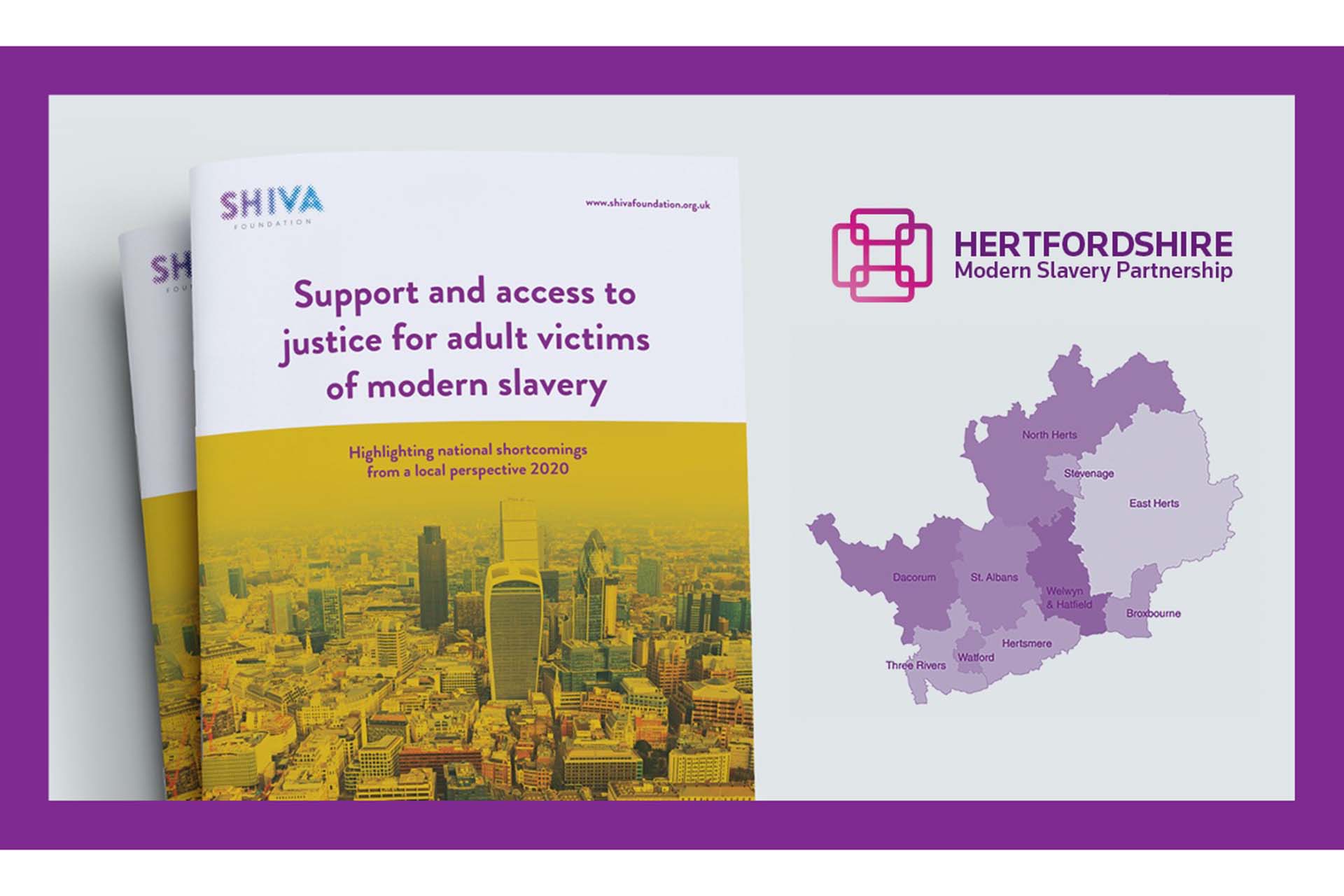
What makes a report successful? We know their purpose is to shed light on a situation either by providing context and/or recommendations for change. Taking our recently published report (“Support and access to justice for adult victims of modern slavery”) as an example, we wanted to look at what makes a report useful for frontline staff and those lobbying for policy changes, particularly at a local level. Here we look at the next steps, once a report is published, how it is used by changemakers to advocate for their cause and what they look for in a report.
This is a conversation between Nina de Selding, Knowledge and Impact Manager at Shiva Foundation and author of the report and Kate Rolle, Hertfordshire Modern Slavery Partnership (HMSP) Coordinator, who provided regional insight and key contacts to understand local context in Hertfordshire and the local support to modern slavery (MS) victims.
The value of research for local level action: Hertfordshire Modern Slavery Partnership work as a coordinator
We spoke with the HMSP coordinator to understand how she works with stakeholders to implement projects to improve local responses to modern slavery. Taking our recent report as an example, we explored how we can transform ideas into actionable results.
Nina de Selding (NS): When you work with local stakeholders, how important is it to bring an idea forward with research or documentation to support it? Do similar examples from elsewhere hold the same weight as providing locally specific evidence?
Kate Rolle (KR): Evidence is obviously really important to demonstrate the demand and need for change. It’s hard to lobby for change if you can’t bring that evidence forward. There can be challenges with the effective recording of public sector data.
We often find ourselves in a chicken and egg situation where stakeholders ask for us to demonstrate the need either through statistics or case studies for example, but the point is that because the issue is not recognised, data is not being recorded.
Data from elsewhere is useful but ultimately when you speak to local stakeholders, they want evidence that the issue is identified locally.
Adult support and needs are under documented (read our research here). In terms of modern slavery and homelessness for example, the Passage was the first organisation to publish work to show the connection between the two issues but, it was more about the connection than projects and what to implement to address the issue. For coordinators, reports are a great tool to prioritise issues and understand what is working well and/or what isn’t.
NS: What information are stakeholders looking for when deciding the implementation of a policy or standard? Obviously, you’ve mentioned data, but how do they go from being interested to mobilising efforts and implementation?
KR: Case studies are very useful. Simply put, seeing practical examples of how things go wrong urges people to action. It’s an unfortunate approach but it is largely explained by the fact that there are limited resources, and practical examples will fuel a sense of urgency to action. Proving statutory duties is also effective in driving change, again because of limited capacity and resources, organisations are very strict to stay within that boundary.
It’s a constant chipping away, using different angles at the political, strategic, operational levels. For example, you push a report forward, but an organisation doesn’t really take note, and suddenly a councillor takes notice, now you have different levers.
With the case of the report you published about support and access to justice for adult victims of modern slavery, what it took was falling into the right hands for internal mobilisation. Since then, there has been further reflection on how to support adult victims of MS which has catalysed the creation of a focused task and finish group looking to understand the gaps more deeply and recommend activity to address these gaps county-wide. It’s had a really positive impact.
Implementing recommendations from our report on support and access to justice for MS victims
NS: As you know, we recently published a report that sought to highlight gaps in support for victims of modern slavery and access to justice for adults by exploring Hertfordshire as a case study. The conclusion was that there can be a disconnect between national policy and local-level implementation. Looking at recommendation 6 [County-wide coordination of housing support to balance regional disparities in available accommodation, broadening the scope of action under the Homelessness Reduction Act 2017], for example, which promotes information streamlining and increased cooperation, walk us through how you would promote it with your local stakeholders?
KR: In Hertfordshire we have a Heads of Housing Group – that would be where I would start to present this idea and workout the feasibility of this recommendation and how we could best implement it. I would also engage with the Adult Safeguarding Board, from an adult victim’s perspective and would include the County Council Commissions on Housing.
NS: This recommendation is not about creating new housing, it’s about coordinating available housing from one district to another, so it’s about cooperation. Could you explain why this is important?
KR: If an adult victim doesn’t have a stable place to recover, they won’t engage to get support, and stability is instrumental for long-term recovery. Currently because of how inconsistent housing provision is across the county, the service you get is basically a post-code lottery. So, if you’re in one district you might get more comprehensive support than in other districts where housing support is more complicated.
NS: Recommendation 7 [County Councils should secure a mandatory budget to provide immediate emergency housing to potential victims of abuse] makes the argument that County Council should secure an emergency budget for victims of modern slavery because that budget often falls on police and, for a string of reasons, that’s not best fit. How would you promote it and translate this recommendation into practice? How much of policy design falls on the coordinator (e.g. determining the required budget amount)?
KR: I would proceed in a very similar way as I would for recommendation 6. A lot of the services are being re-commissioned in 2022, when that happens, these new contracts would have to implement this recommendation when needed. I wouldn’t feel comfortable commissioning services the way the Commission Providers do (determining the exact budget required); they have the information and experience to determine the cost of such policies. I can only advocate that it is needed.
NS: Locally, besides budget constraints what are common barriers to better support of MS victims? How is this specific to the local context?
KR: Well, there are barriers that exist nationally, regardless of local context, like the lack of recognition by the victim themselves that they are, in fact, victims of exploitation. Locally, many stakeholders are still unable to identify a potential victim and there is still a lack of clear processes. This is probably due to the fact that modern slavery is still a relatively ‘new concept’ compared to domestic abuse, for example. But this lack of processes differs locally. Without extra resources and clear statutory guidance from government, particularly if you have a two-tier authority like in Hertfordshire, roles are unclear. In London boroughs there is a single-tier authority which makes it easier.
NS: As a coordinator, how do you select recommendations/ideas to push to local stakeholders?
KR: I try to prioritise feasibility first. A useful report, like the Support and access to justice for adult victims of modern slavery report, will provide a blueprint. Also, there are some changes that require central government action, so as a coordinator, I might not prioritise these issues as much when I’m engaging with local organisations.
NS: Which of our report’s recommendations or ideas are you are hoping will be implemented in Hertfordshire?
KR: I would say recommendation 5 [Local authorities should use existing support infrastructures to ensure HTMS victims are cared for] and recommendation 7 [about the mandatory budget for emergency housing] because victims need a safe place to go to in order to be supported.
The more they are supported by services in collaboration with statutory organisations, the more modern slavery is rightfully seen as a significant crime locally, and this creates momentum. We need to identify more victims to show the magnitude of the issue. This in turn gives us the leverage to put stronger practices in place.
To find out more about Support and access to justice for adult victims of modern slavery, visit here.


